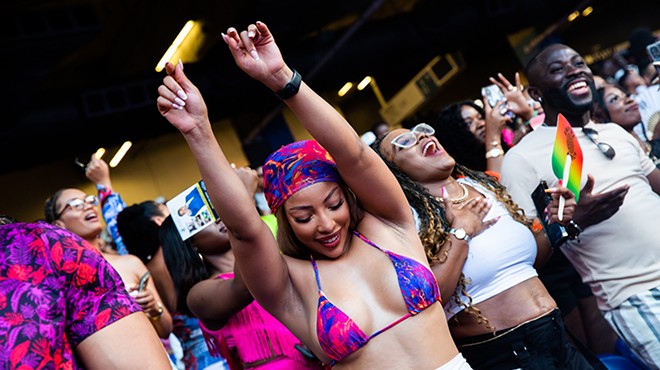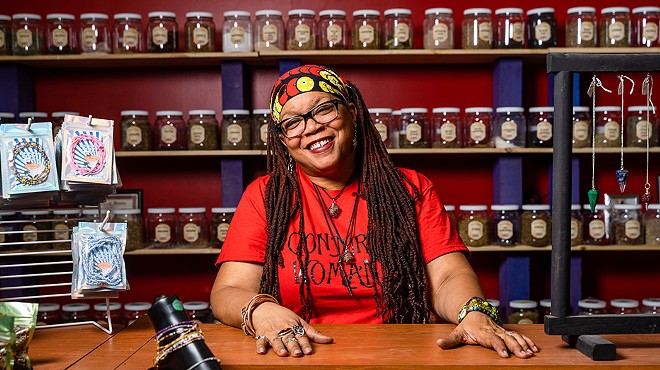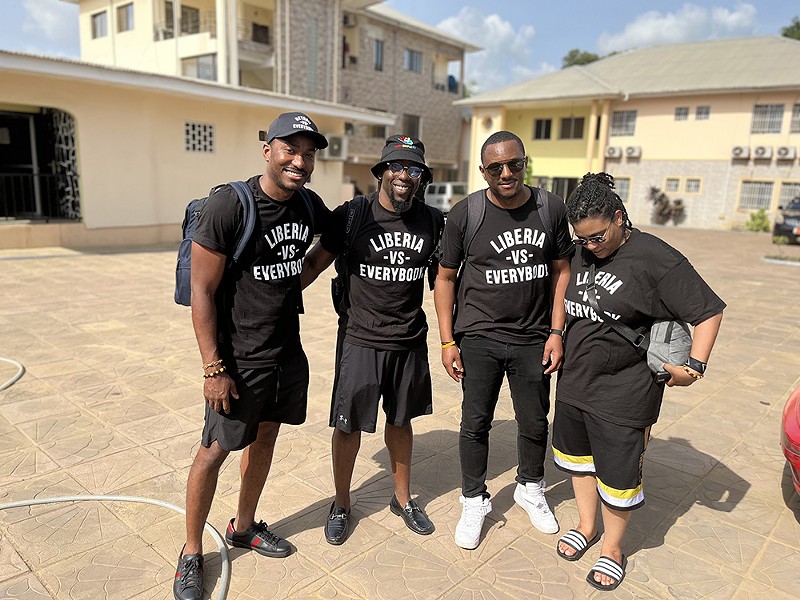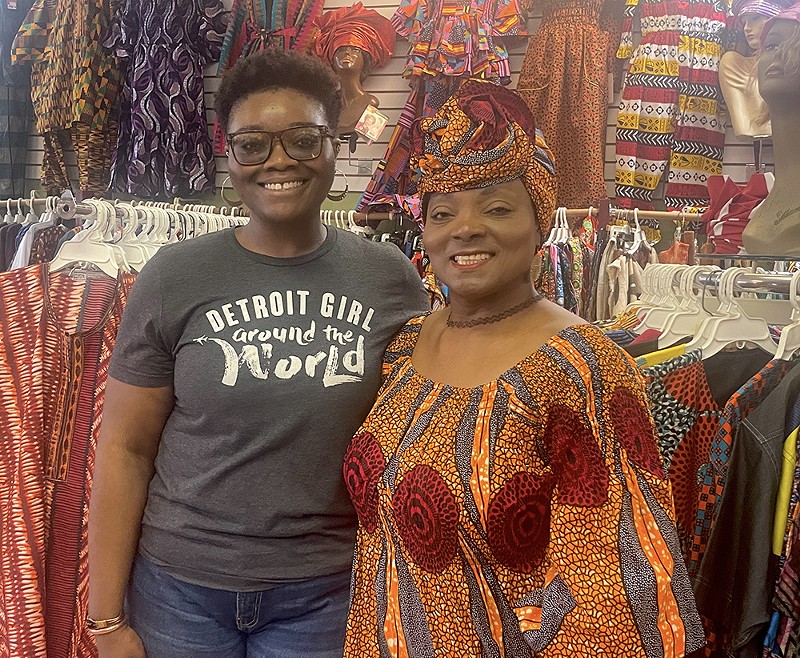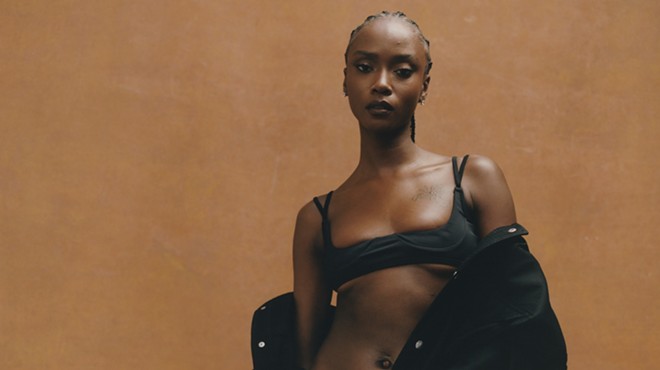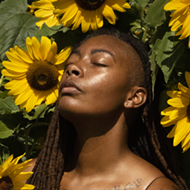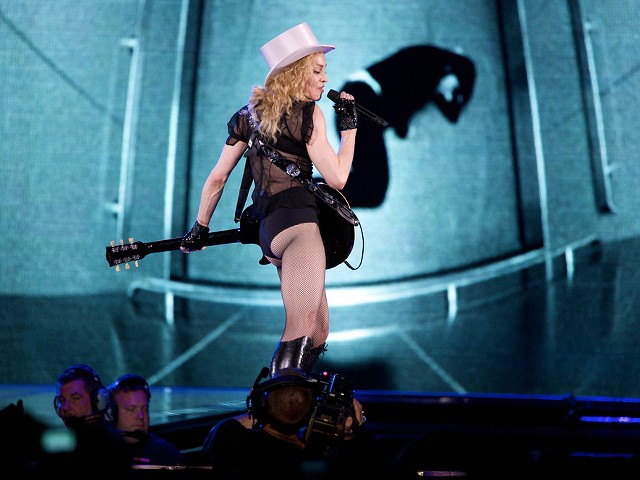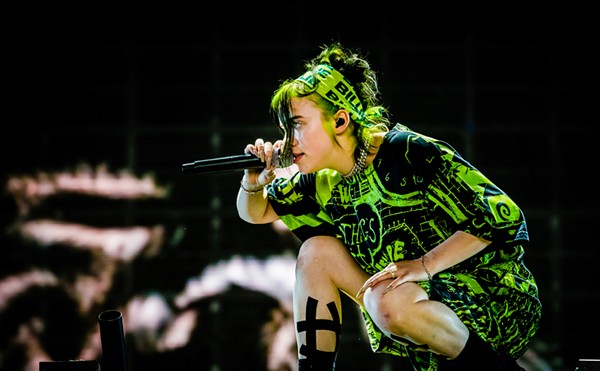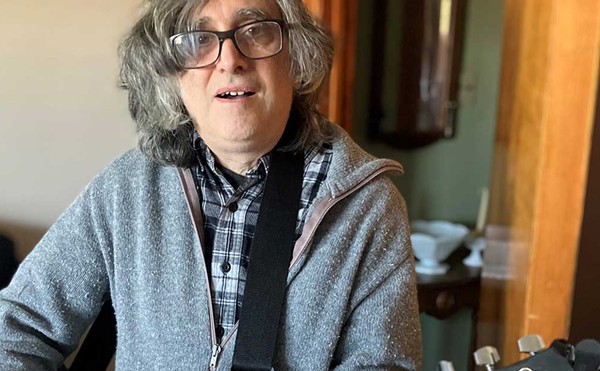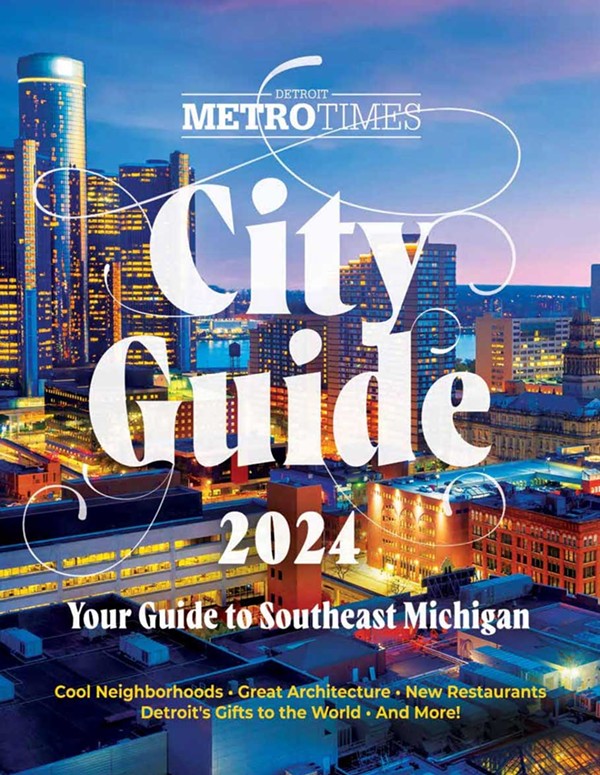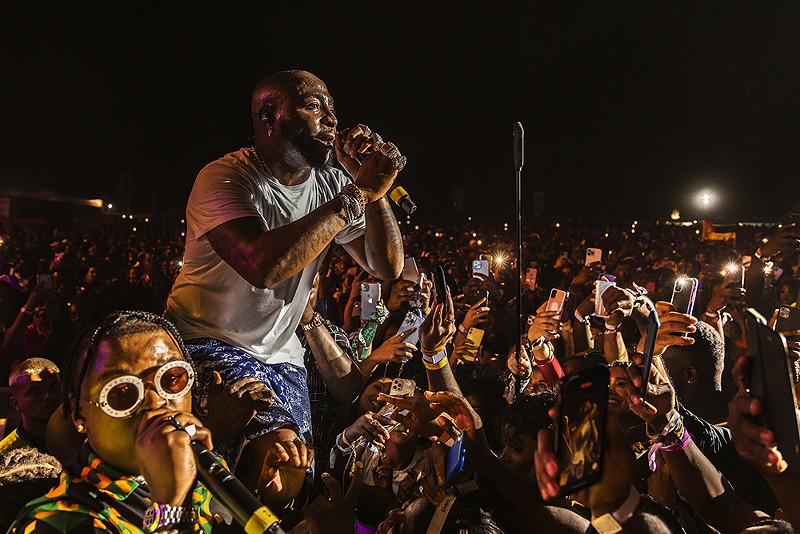
When we asked the organizers of Afro Nation to describe the vibe of the festival, they looked at each other speechless. “You just have to experience it,” they finally replied. “It’s [like] nothing you’ve ever seen before.”
Afro Nation is touted as the world’s largest Afrobeats festival, and it’s coming to Detroit this weekend. Calling it just an “Afrobeats festival” isn’t completely accurate, however, as it’s dedicated to music from across the African diaspora. Acts run the gamut from any and every genre created by Black folks, whether it’s hip-hop, dancehall, reggae, amapiano, or good old-fashioned R&B.
Detroit vs. Everybody CEO Sean Williams, who has attended the festival in the past, tells us, “I don’t think the Detroit market knows what’s about to happen. They’re about to get smacked in the face with African culture.”
The massive music and culture festival launched in 2019 in Portugal. It started with about 20,000 attendees and grew to over 40,000 fans who flocked to the beaches of Portugal to see acts like Burna Boy, Wizkid, and Megan Thee Stallion in 2022. It has since traveled to Ghana and Puerto Rico, and Detroit is only the second U.S. city to host the festival following Miami, where Afro Nation was held in May.
Videos of past festivals show crowds of Black and brown people in all shades dancing and smiling as they wave flags from Jamaica, Nigeria, Ghana, South Africa, and other countries. Women come flaunting their box braids, locs, and fresh twist outs — it feels like Coachella for Black music.
“Everyone is just caring for each other and everyone loves each other,” Josh Koram, who handles artist bookings for Afro Nation, tells Metro Times. “There’s no negativity. Everyone understands that we can connect. We can expand this culture. Everyone loves the music and there’s no bad vibes.”
The festival’s co-creator Smade adds, “Afro Nation means love. It means culture, discovery, but also knowing who you are and identifying your roots.”
Not only will the Detroit edition of the festival include performances by Burna Boy, Ari Lennox, Latto, Kamo Mphela, Dadju, and Ebony Riley, but it will also highlight local Black businesses with African roots like Detroit vs. Everybody and Sterose International Boutique. Leading up to the festival is a series of pre-parties including a Jerk X Jollof takeover at Monroe Street Midway, a stand-up comedy show featuring Nigeria’s Kenny Blaq, and a series of panel talks.
Afro Nation is more than just a two-day music festival. It’s even beyond a gathering of Africans, American or otherwise, descending on a city to have a good time with good vibes. It’s a mecca of unapologetic Blackness that puts the spotlight on not just music, but unity, and community. Think the “I’m blackety Black” song from CB4 but replace the satire with Black joy and genuine love for the culture.
It’s also reflective of the increasing wave of Black Americans reclaiming their African ancestry through fashion and spiritual practices like hoodoo and the West African Yoruba religion.
As a Ghanaian Londoner from the U.K., Koram says his parents instilled a sense of African pride in him, but it wasn’t always “cool” to embrace his heritage.
“But then there was just this shift that occurred, where it became, ‘No I’m proud to wear my African attire.’ When my mom wears her gele [a type of headwrap], she’s a queen. I’m happy to see it,” he says.
In the U.S. we have two things to thank for the seeming surge of Black people embracing their African ancestry within the last decade — Beyoncé, and Ghana’s Year of Return campaign.
Yes, we said Beyoncé. When Bey dropped her 2016 visual album Lemonade, she introduced the Yoruba orishas (or spirits) to American pop culture by channeling the river goddess Oshun. In the video for “Hold Up,” Beyoncé emerges from a doorway of gushing water as Oshun wearing a flowing yellow dress, similar to how the goddess is often depicted. She continued to embody the deity of sensuality and fertility in her pregnant 2017 Grammy performance and 2020 album Black is King. Of course, we’re not crediting Beyoncé with creating the tradition, but prior to her visual references, many of us were unfamiliar with these distinctly African deities.
In 2019 the Ghanaian government launched its Year of Return campaign to encourage Africans living throughout the diaspora to travel, invest, and live in Africa, especially Ghana. (The year 2019 marked 400 years since the first enslaved Africans arrived to what is now the continental U.S., by way of the then-British colony of Virginia.) Ghana’s Afrochella festival, held in Accra, helped boost the number of people, especially African Americans, traveling to Ghana to immerse themselves in the culture. The festival has since rebranded to Afro Future Fest (not to be confused with the Detroit-based AfroFuture Fest).
Afro Nation was held in Ghana in 2019 and 2022. Smade says the festival gave Black people wanting to explore Africa a reason to finally do so, and several attendees decided to move to Ghana afterward.
Acts run the gamut from any and every genre created by Black folks, whether it’s hip-hop, dancehall, reggae, amapiano, or good old-fashioned R&B.... It feels like Coachella for Black music.
tweet this
“A lot of people stayed back because they saw a different side than what they’ve seen online, and they fell in love with it,” he says. “They fell in love with the people. Some people bought houses there. Some people started businesses there. Some people even got married there. We have Afro Nation marriages and babies. It’s really a community.”
Afro Nation Detroit will be held at Bedrock’s Douglass Site, where the former Brewster-Douglass Projects once stood. The complex was once home to Motown legends like Diana Ross, Smokey Robinson, Mary Wilson, and Florence Ballard. It’s also a place that holds a lot of trauma for Detroiters as part of the sprawling Black neighborhood Paradise Valley was demolished to make way for the high rises, which were the first federal public housing project for African Americans. Many Detroiters in the neighborhood were forced to leave their homes and move into the projects, and Paradise Valley was eventually razed completely and turned into the I-375 freeway.
Smade says the history is part of the reason the site makes the perfect grounds for Afro Nation as it writes positive new chapters in the Black history books. Portugal, where the festival is most commonly held, also holds historical trauma as it’s where the transatlantic slave trade began.
“The land where we do it is the same land and port that our ancestors were shipped to from Africa,” Smade says. “Portugal is a spiritual ground.”
Africa vs. Everybody
Though local clothing brand Detroit vs. Everybody has seen national notoriety and even Gucci collabs, Williams says he didn’t find his purpose until he traveled to his mother’s home country of Liberia.
There he realized he had a responsibility to use his platform for more than T-shirts, and decided to support Liberian businesses however he could.
Though he’s always felt connected to his Liberian roots, Williams hadn’t been able to visit the country since he was two years old, due to a raging civil war. After 14 years of conflict, the country began to gain stability in 2003 and Williams would return after his grandfather passed away in 2018.
Williams’s great, great-grandfather was once the president and vice president of Liberia, and his mother’s generation has inherited various assets including a large amount of land in the country following his grandfather’s passing. As part of his Africa vs. Everybody campaign, Williams is donating 20 acres of his family’s land to an orphanage in Mount Barclay.
“I don’t believe in coincidences. The fact that I’m also from Liberia, I have to use what I have to help amplify them as much as I can,” he says.
Williams makes a “vs. Everybody” shirt for nearly every country he travels to, and it’s typically tied to some sort of social justice campaign. The brand did a Ghana vs. Everybody run and is in the process of fundraising for programming to help Ghanaian youth break into the fashion industry. He’s also launching an “economic tourism” initiative that will give travelers the chance to invest in Liberian companies.
“Most times people go to Africa, they go on a safari, hit the different tribes, buy some African art, eat some African food, but what about actually engaging with people on the ground?” he says. “In Liberia, the average person is making $150 [to] $200 a month. … So we’re going to take you to Liberia, you can do all the touristy stuff, but we’re going to introduce you to business owners who will pitch you in real-time and if it’s something you want to engage in, you can invest your money.”
“We need to embrace everybody. Some people are not willing to remember where they came from, and we have to let them know that look, we are brothers and sisters no matter what.”
tweet this
He adds, “Our whole goal is not to sell shirts, it’s to help our people,” noting that he once invested $3,000 in a Liberian bar.
“The average American wastes that type of money within a couple of months,” he says. “You can transfer those dollars over there via economic tourism. I’m trying to build that program out right now… These are my people. I need to invest in [them].”
Detroit vs. Everybody has been at Afro Nation in Portugal and Miami as well as the 2022 Afrochella in Ghana.
At the Detroit festival, they’ll have shirts highlighting the different genres of music — Amapiano vs. Everybody, Afrobeats vs. Everybody, Africa vs. Everybody, and Afro Nation vs. Everybody — that attendees can customize onsite by adding the flag of whatever African nation they want to represent.
Throughout his travels, Williams realized Liberia had a lot of similarities to Detroit when the city was “down and out.”
“Detroit is coming out of that, but there’s a lot of political corruption… and it’s just this place where they need some type of morale boost,” he says.
So he did a pop-up shop in Liberia with Liberia vs. Everybody shirts on the country’s Independence Day, July 26. It was so popular that the shirts are now sold in one of the country’s airports and hotels.
The Africa vs. Everybody campaign has spread to South Africa, Kenya, and Ghana, where Williams has partners.
“[It] ended up turning into this whole empowerment movement for the African continent,” he says. “Everybody has their own version of what ‘vs. Everybody’ means to them.”
Making home
Sterose International Boutique is one of the oldest, if not the oldest African clothing shops in Detroit. They’ve been in business for roughly 25 years, and 18 of those years have been at 13313 W. McNichols Rd., where they’re stationed currently.
The humble shop is filled with brightly-colored dashikis, dresses, and skirts in busy Ankara prints, but is most known for its gele; church-hat-style headwraps that make the wearer look like they’re wearing the sun on the back of their head. The shop is owned by Roseline and Stephanie Onwenu, a mother-daughter duo whose names combine to make “Sterose.”
People typically come to Sterose when they want to get dressed up for African weddings or any Afro-centric events, and the Onwenus take pride in making people look good.
“People pop up in here like. ‘I want this, give me the headpiece,’ and we’re like, OK, bet. We hook you up and you leave looking fancy. Then they spread the word,” Stephanie says. “That’s how we build community and also educate people, because some people might not know what things are. They look at the hats and go, ‘What is that? What is this fabric?’”
The “hats” she’s referring to are the gele.
“If you’re going somewhere you want to create attention then you put [a] gele on,” Roseline says, beaming. “When you put your gele on people will look at you differently.”
Roseline moved to Detroit from Nigeria in 1988. She had dreams of opening her own boutique in the U.S. like her mother had in Nigeria. Stephanie helps run the business just as Roseline helped her mother in the store when she was a young girl.
Sterose will also be at Afro Nation Detroit. Roseline grew up listening to Afrobeats and says she’s excited that the rest of us are finally catching on, while Stephanie notes she’s getting her knees ready for Burna Boy.
When Smade and Koram stopped by Sterose ahead of the festival, Roseline says it felt like her family was visiting from home.
Afro Nation Schedule
Thursday, Aug. 18
• The Laughing Leopard Stand-up comedy show featuring Kenny Blaq, Comedian CP, Josh Adams, Comic J. Will, and Mic Larry
7-11 p.m.; One Campus Martius; 1 Campus Martius, 16th floor, Detroit; 21 and up
Friday, Aug. 18
• Homecoming Conversations “Innovation in Music” and “There’s No I in Team”
Noon-4 p.m.; One Campus Martius; 1 Campus Martius, 16th floor, Detroit
• Jerk X Jollof Official Afro Nation Detroit Welcome Party with sounds by Walshy Fire, Blakito, and Sky Jetta
4-10 p.m.; Monroe Street Midway; 22 Monroe St., Detroit; all ages
Saturday, Aug. 19
• Afro Nation Detroit Main Stage: Burna Boy, Ari Lennox, Kizz Daniel, Latto, Dadju, Skillibeng, Diamond Platnumz, Victony, Nissi
• Piano People Stage: DJ Maphorisa, Musa Keys, Kamo Mphela, DJ Moma, Tyla, 2woBunnies
Bedrock Douglass Site, 1900 St. Antoine St., Detroit
Sunday, Aug. 20
• Afro Nation Detroit Main Stage: Davido, P-Square, Coi Leray, Naira Marley, Maseo, Tay C, Stonebwoy, Libianca, Ebony Riley
• Piano People Stage: Major League Djz, DBN GoGo, Focalistic, Mr JazziQ, Sha Sha, TxC
Bedrock Douglass Site, 1900 St. Antoine St., Detroit
Lineup and set times subject to change. More information at detroit.afronation.com.
“I love their intention and what they say about bringing people together,” she says. “It’s claiming what belongs to you. It’s yours. You’re African. Why are you running away from it?”
She also says she wants to see less division between people born in Africa and African-Americans.
“You know who you are and nobody [is] gonna take that from you,” she says. “We need to embrace everybody. Some people are not willing to remember where they came from, and we have to let them know that look, we are brothers and sisters no matter what.”
Smade is also originally from Nigeria and moved to the U.K. on his own at the age of 19 to study marketing and advertising. Like Roseline, he grew up listening to Afrobeats and was inspired by it from a young age.
“I’m a traditional Yoruba boy from Nigeria,” he says. “I was born in Lagos, so my dad used to take me back to the village and I fell in love with those festivals that I used to see. That was what drew me to the music initially. I enjoyed my parents playing a lot of Afrobeats, [like] Fela [Kuti]... That was proper, traditional music.”
Smade started throwing house parties in the U.K. because nightclubs weren’t playing Afrobeats.
“Back in 2004, 2005 it was so hard,” he says. “You had to go beg for anyone to play our music, but I never stopped promoting Afrobeats.”
Eventually, the house parties did move to the club as the interest in Afrobeats grew. From there Smade connected with Nigerian singer Wizkid, who stayed at his house the first time he ever performed in the U.K.
Wizkid’s 2020 album Made in Lagos made everyone pay attention to the infectious power of Afrobeats if they weren’t already. The Grammy-nominated album infused Afrobeats with pop and R&B and though it didn’t actually win, it signaled to the world that Afrobeats was a genre to be taken seriously. Wizkid did, however, score a Grammy win for “Best Music Video” for his role in Beyoncé’s “Brown Skin Girl.”
“We used to talk about all of this: selling out stadiums, traveling, and taking Afrobeats around the world,” Smade says about Wizkid. “He used to talk about the Grammys and all of that, and now all of that is happening, so it’s just a beautiful, grateful moment in my life.”
Subscribe to Metro Times newsletters.
Follow us: Google News | NewsBreak | Reddit | Instagram | Facebook | Twitter

